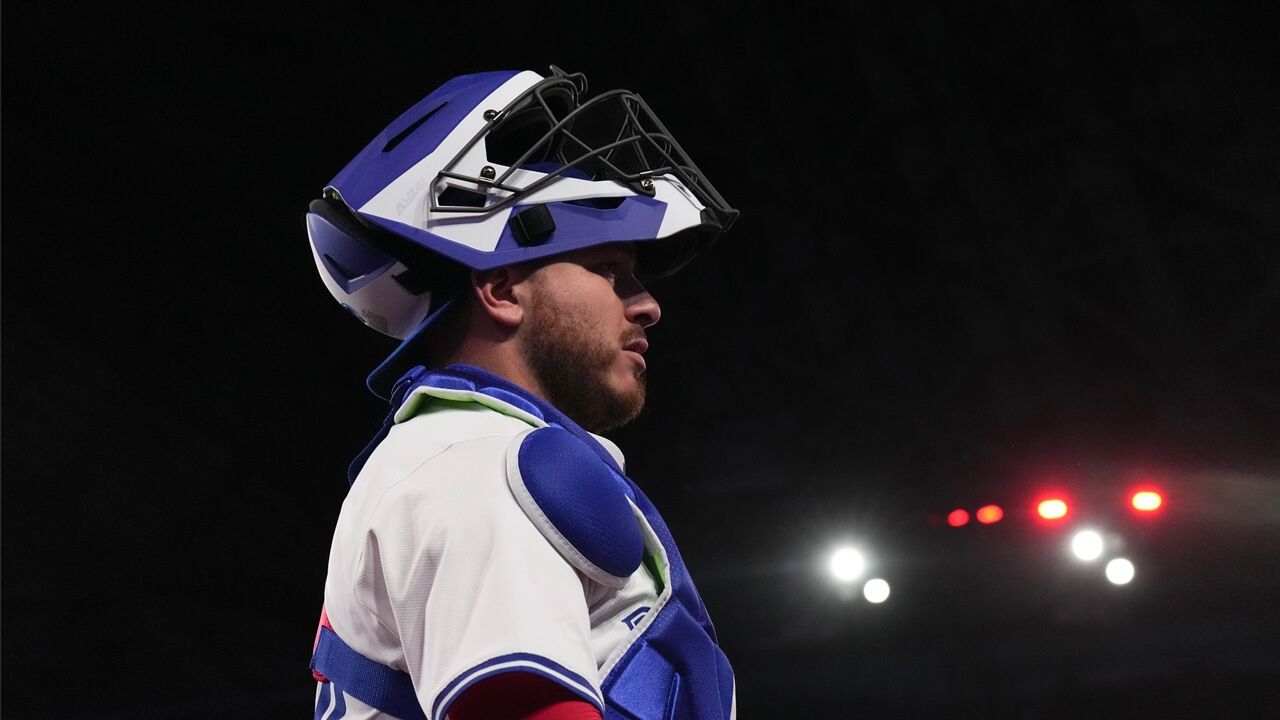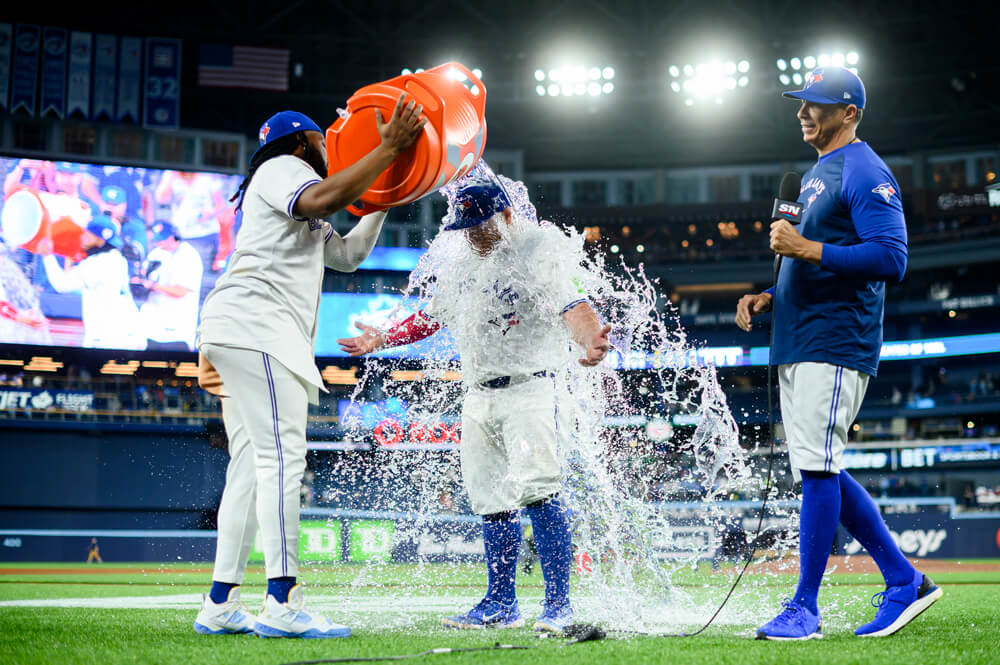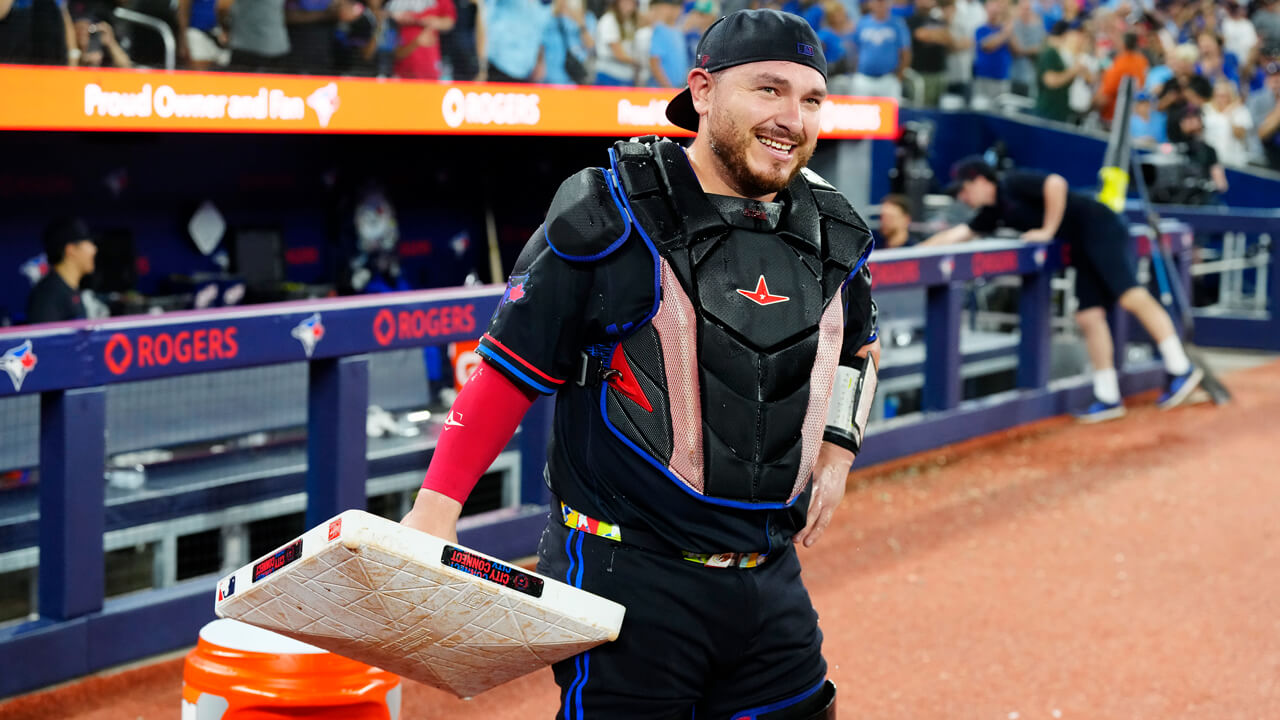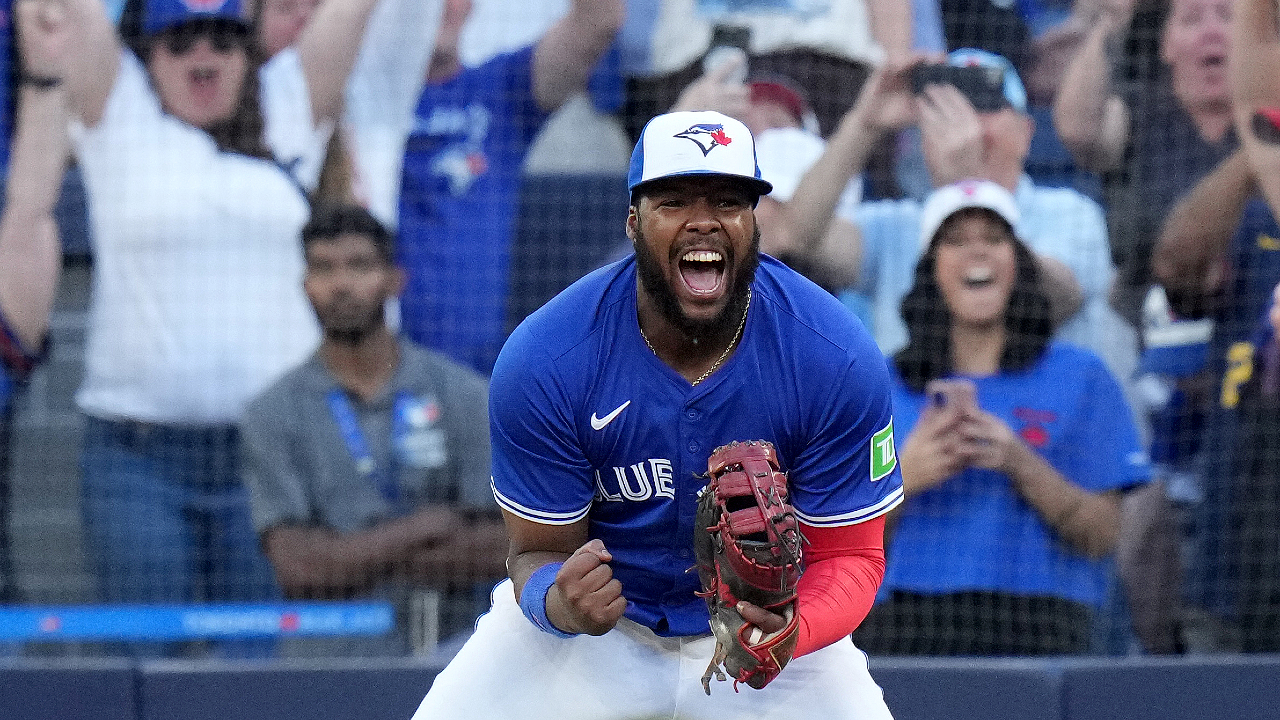
GOING STEADY

A
lejandro Kirk finished jogging from first base to home and, not long after he touched the plate, the Toronto Blue Jays catcher turned to face his teammate Daulton Varsho, who was rounding third and on his way home. Varsho had just hit his 13th home run of the season, and he started laughing when he set eyes on Kirk. The catcher, wearing a big grin, pointed to his teammate and then high-fived him after Varsho scored to make it 10-1 Blue Jays. Kirk’s reaction to the two-run shot may seem pretty standard, but not only did Toronto have a nine-run lead against the Texas Rangers in mid-August, this was also a level of excitement rarely exhibited by the teammate everybody calls “Kirky.”
“That’s when I’ve seen him amped: when he doesn’t have to run hard around the bases,” Varsho says of Kirk, with a laugh. “I know for a fact that he’s real excited when that happens.”
Kirky had at least two reasons to be amped up, then, as he jogged around the bases, yelling and fist pumping, after hitting his first career grand slam in the opening inning of Game No. 162. It was the beginning of a performance for the ages from the catcher, who added a double and another homer to send the Blue Jays back to the American League Division Series for the first time in almost a decade. When Kirk took the field after the final out for a post-game interview with Sportsnet’s Hazel Mae, a crowd of more than 40,000 people went absolutely nuts for him, chanting “M-V-P! M-V-P!”
But even after that whopping six-RBI afternoon, which also saw his foot connect with home plate to score the winning run, Kirk didn’t take long to settle. As Ben Nicholson-Smith noted after the game, while teammates celebrated the division title with champagne and shirtlessness, Kirk “quietly sipped a beer” in the background. Which is so perfectly Kirk, because though the Blue Jays can’t expect an MVP performance from their catcher every time out, what they can consistently rely on from him heading into this highest-of-stakes post-season is his ability to remain incredibly calm through everything to come. Kirk is known for a heartbeat that seems to stay low and steady even in pressure-cooker situations. And the fact No. 30 hit his grand slam with a 2-2 count and his team trailing in the most important game of the regular season provides further evidence Kirk embodies the oft-spewed sports cliché that you never want to get too high or too low. Asked to explain how he manages it, Kirk shrugs: “I think I have always been like that,” he says, speaking in Spanish through the team’s translator, Hector Lebron.
The way he has “always been” is one reason the two-time all-star is a quiet leader in Toronto’s clubhouse, because Kirk’s calm can be contagious. That steadying leadership has the potential to go a long way in the biggest moments of all — like, say, when your team is heading to the ALDS for the first time in nine years. As the pressure rachets up, you can count on the Blue Jays backstop to meet every game with the approach of a guy strolling through the park on a sunny Sunday afternoon, hopeful that his buddies will follow suit.

A
s a young kid playing little league in Tijuana, Kirk always had designs on playing Major League Baseball. It wasn’t until he was 18 or 19, though, that he believed he could make it. “I mean, we all have that dream, don’t we?” the 26-year-old says. “But playing in the big leagues, only one per cent can achieve that dream.”
Sometimes members of the one per cent are very apparent. “I knew he was going to be a big leaguer ever since I first saw him hit,” says utility man, Davis Schneider, who met Kirk when they were teenagers playing rookie ball in the Blue Jays’ minor-league system. “It was his demeanour in the box and the way he swung the bat. I feel like it was just different when it came off his bat, even at 18. Everyone kind of knew it, too, not just me.”
Everyone certainly knows it now. Among qualified catchers, Kirk’s .282 batting average ranks first overall and his .348 OBP is third-best. League-wide among qualified batters at all positions, only Luis Arraez has a better average than Kirk when facing two strikes. Kirk’s is .270, and that his performance in that scenario is close to his overall average is telling.
“He stays calm in the pocket, and he’s pretty special in that regard,” says Blue Jays hitting coach, David Popkins. “No moment is too big. And it’s why in those big moments you typically want a guy like that up because he’s going to be the same whether it’s the World Series or it’s the first game of the year.”
Since 2020, Kirk has played in five post-season games and logged six hits and a walk, with a .500 OBP in the 2023 AL Wild Card Series, his last playoff appearance. This season, he struggled at the plate for a stretch, but on Sept. 13 he came off the bench and broke an 0-19 hitless streak with an RBI single in the eighth and a walk-off sacrifice fly in the ninth to give Toronto its MLB-best 45th comeback win. As teammates mobbed him at first base, Kirk was jumping up and down and hugging them, too. He showed as much emotion as we’ve seen from him this past Sunday, too. Kirk does celebrate when the moment calls for it.
“I think I’ve actually seen more emotion out of him this season,” George Springer decides, though he also points out there has been plenty this season to factor into that increased expressiveness. “He’s really good at being reserved,” Springer adds.
Kirk’s calm helps him frame the plate for pitchers, too, if you ask Davis Schneider. “It looks like he’s just picking tissues back there, just the way he catches the ball, and that’s what makes him great,” Schneider says. “I feel like you can see a lot of strikes if you’re calm, if you’re not all over the place … And Kirky makes it look so easy.”
Varsho, who started his MLB career as a catcher, has a deep appreciation for what Kirk offers behind home plate and says catching is “an art” Kirk has mastered.
“He’s really good at taking the pitches that are off the plate and making them look like strikes. It’s really impressive,” Varsho says. “There’s a lot of elements that go into that: Blocking out the umpire, being able to move your glove quick, but also being in a good position to be able to use your glove. He does all of that extremely well.”
Blue Jays starter Chris Bassitt says Kirk is “obviously one of the best, if not the best in the league,” at framing the plate. “From that standpoint, it’s great to obviously be around the zone, because you know the zone could potentially be a little bit bigger than it needs to be,” Bassitt explains. “Then hitters understand that too, and they’re more likely to chase.”
Kirk ranked second overall among catchers at converting strikes to runs saved this season according to Baseball Savant. He converted 47.1 per cent of pitches thrown in the shadow zone (the area bordering the strike zone) into called strikes, which was fourth-best in MLB behind only Austin Hedges Patrick Bailey and fellow Blue Jay Tyler Heineman.
In addition to that skillset, Bassitt also points to Kirk’s “durability” as one of his best qualities, along with his ability to speak both Spanish and English. “It’s just him being able to play every single game. And then him being bilingual obviously really helps, too,” Bassitt says. “Him being able to basically have communication and in-depth communication with everybody on the team is big.”
Kirk bristles at the idea that he might be a leader in the clubhouse thanks to the many unique qualities he brings to the team. “I don’t think of it that way,” he says, though he concedes that by “doing my job,” maybe he’s “a little” bit of a leader.
There’s no question if you ask his teammates that Kirk brings much more than just a little leadership. There are many fans of the guy Ernie Clement calls “the big, steady rock behind home plate” in the Toronto Blue Jays clubhouse.
“He’s the man,” says Davis Schneider.
“I don’t know anybody who doesn’t love him,” adds Springer.
“Kirky’s one of the best guys in the league,” says outfielder Myles Straw, who joined the Blue Jays this season after playing in Cleveland and Houston. “One of the best catchers, one of my best teammates.
“Yeah, we all love Kirky.”

T
he Mayo Clinic is a worldwide leader in health care and it cites a “regular” resting heart rate as registering between 60 and 100 beats per minute, which is a wide span indeed. Kirk says he isn’t sure what his heart rate clocks behind the plate or when he’s up to bat. “I feel very good, and I feel I can control those moments,” he says. “I think it’s very low.”
Just how low could it be when he’s playing, though?
Popkins says: “I think he has a sniper heartbeat at all times.”
Varsho figures it’s around 40 when he’s hitting, “but maybe not when he’s running.”
“It’s as close to zero as you can possibly be without, you know, dying right on the spot,” says Clement.
“Sometimes I’ve got to make sure he’s alive down there,” Straw adds, with a laugh. “I mean, it could be bottom of the ninth, 2-2 and you would think he’s on the beach. I’m walking back and forth, ready to do something, he’s sitting in his catcher’s gear, chilling, and he’s up, like, third. He has some of the craziest poise I’ve ever seen in any human being, ever.”
It’s Kirk’s dad, Juan Manuel, who the catcher points to as the main reason for his steady presence. “My dad is a very calm person. I don’t think I’ve ever seen him worried about anything, so I would say it’s more genetic from my dad’s side,” Kirk says. “But the experience also helps a lot. We have played here for a long time, and I think that helps.”
Kirk is now in his sixth season in Toronto, and entering his fourth post-season after three Wild Card series losses, in 2020, ’22 and ’23. Since his earliest days in Toronto, Kirk has become more vocal in meetings with pitchers, something John Schneider, the Blue Jays manager, has encouraged. Still, much of his leadership requires very little communication.
“Baseball is very similar like you would go to the zoo, right? We all kind of mirror each other,” Popkins explains. “If people are happy and calm, it’s contagious. That’s what he brings.”
“I think in times of stress during the game, you can always look at him and he’s just going to have the same expression. It’s going to be the same mood,” Springer adds. “He’s going go up there, have his at-bat, whether he does good or bad, and then he’s going to come back and go get his gear and walk out to the field. He’s the same guy every day, and that consistency helps.”
“It definitely makes us play a little bit more calm too, just because when you’re out there, maybe your emotions kind of get to you, or actions get to you, but whenever you see Kirky being all relaxed, you’re like, ‘Alright, if you can be relaxed, why can’t I?’” Davis Schneider says. “And that goes a long way for a teammate to look like that.”
It pays off especially for the pitching staff, as Bassitt points out. “We’re usually outgoing and loud,” says the right-hander, who defines himself as the owner of both of those personality traits. “In bigger moments, usually guys that are already up get a little more up than they need to be, so he kind of brings you back down to where you should be.”
“I think that helps in that standpoint when games are getting big, loud, that he’s able to slow everybody down and kind of get them to go at his speed,” Varsho adds.
Speaking of his speed, the Blue Jays and the team’s fanbase got to witness it in a way they never had on Aug. 15, when Kirk stole his first Big League base. That very base is leaned up in Kirk’s locker now, and he points to it with a big smile on his face. “That was one of the highlights of my year, watching Kirky steal a base,” says Schneider, the manager. “And no, Kirky stealing a bag is never on my bingo card.”
Though running isn’t his cup of tea — the five-foot-eight, 245-pound Kirk has one career triple to go with that single steal — he likes to poke fun at himself when it comes to his jets. Standing on third during a game, he’ll joke with coach Carlos Febles: “Don’t send me unless it’s at the wall.” Kirk had a bet going with former Blue Jays catcher Danny Jansen about who could steal a base first. Jansen won that bet in 2022, but the Blue Jays manager thought it was going to happen earlier that season for Kirk. Schneider can’t remember who was pitching, but the ball was slow getting to the plate. “Kirky actually broke, but it was foul ball. I think he would have had it, though,” Schneider says.
“Kirky is unique in so many ways,” the manager adds. “I think being at that position, it can be calming for pitchers, it’s calming for a manager, having a guy that you know is not going to be overwhelmed in any situation.”
Kirk knows his ability to keep others around him more relaxed will be important as he makes his first appearance in the ALDS. “To be able to control that in big situations, keeping yourself in control, it’s very important, especially behind home plate. You have to make a lot of big decisions in the game,” Kirk says. “It’s very important for me to stay that way and spread that to the rest of the team.”
John Schneider saw that ability back in 2020, when Kirk made his playoff debut as a 21-year-old rookie. “That’s one of the reasons that we gave him the contract we did is because he’s going to respond the same in any pressure-packed situation,” Schneider says, referencing the $58-million extension the catcher signed earlier this year. Kirk piled on the evidence on that front earlier this week, too.
In Kirk’s locker, there’s a hat that reads: “Dad Gang Dept.” He smiles and describes the moment his two-year-old daughter Emilia was born with one English word: “Overjoyed,” he says.
Kirk didn’t shed tears of joy that day, though, even if he felt they could’ve easily flowed. “I was super happy, but I had to control myself because imagine if my wife sees me crying, she’s going to get more emotional,” he says. “I didn’t want my wife to see that, so I did not cry.”
That’s Kirk for you, always in control. He’ll cry if he wants to, and until then, the rest of the Blue Jays will do their best to follow his very relaxed lead.
Chris Young/CP; Christopher Katsarov/CP; Frank Gunn/CP.





